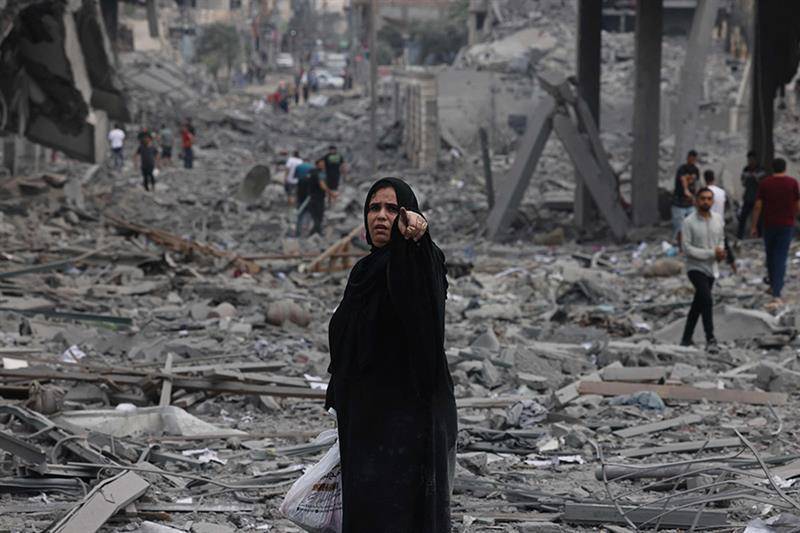U.S. and Arab officials, diplomats, and analysts believe Israel risks entering a long and bloody insurgency if it defeats Hamas and occupies the Gaza Strip without a credible withdrawal plan and a path toward establishing a Palestinian state post-war. Two U.S. officials, four regional officials, and four diplomats familiar with the discussions reported that all ideas proposed by Israel, the United States, and Arab countries for managing the post-war phase in Gaza have not received widespread support, raising concerns that the Israeli army may become exhausted in a long-term security operation. While Israel maintains control over northern Gaza, some officials in Washington and Arab capitals feel the country is overlooking lessons learned from the U.S. invasions of Iraq and Afghanistan, which followed quick military victories with years of violence and extremism. Diplomats and officials indicate that if the Hamas-led government in Gaza is overthrown and its infrastructure and economy are destroyed, a radical fundamentalist trend among angry residents could lead to an uprising against Israeli forces in the narrow streets of the territory.
Israeli Prime Minister Benjamin Netanyahu stated earlier this week that the Palestinian Authority in its current form should not assume responsibility for Gaza. He mentioned that the Israeli military is the only force capable of eliminating Hamas and ensuring that terrorism does not return. Following Netanyahu's remarks, Israeli officials insisted that Israel does not intend to occupy the Gaza Strip. Mohammad Dahlan, a former security chief in Gaza until the Palestinian Authority lost control to Hamas and whose name has been suggested to lead a post-war government there, indicated that Israel is mistaken if it believes tightening its control over Gaza will end the conflict. Dahlan, speaking from his office in Abu Dhabi where he currently resides, asserted that Israel "is an occupying force and the Palestinian people will deal with it as such." He added that Hamas leaders and fighters would prefer to blow themselves up rather than surrender. Dahlan highlighted the lack of vision for Gaza's future among Israel, America, and the international community, urging Israel to stop the war and begin serious talks about a two-state solution.
U.S. President Joe Biden warned Netanyahu on Wednesday that occupying Gaza would be a "big mistake." Diplomats say the U.S. and its allies have yet to see a clear roadmap from Israel regarding a strategy to exit Gaza apart from the stated goal of eliminating Hamas. U.S. officials are pressuring Israel to provide realistic objectives and a plan for how to achieve them. While some U.S. officials assert Israel's right to defend itself, they are concerned that a rising civilian death toll could lead to further radicalization among Palestinians and drive new fighters into the arms of Hamas or armed groups that may emerge to replace it in the future, according to a source familiar with U.S. policymaking. More than a dozen Gaza residents interviewed by Reuters stated that the Israeli invasion is giving rise to a new generation of militants.
Abu Mohammed, a 37-year-old government worker in the Jabalia refugee camp, expressed a preference for death over Israeli occupation. He told Reuters, refusing to disclose his full name for fear of retribution, "I am not (a member of) Hamas, but in times of war, we are all one people, and if they eliminate the fighters, we will take up arms and fight... The Israelis may occupy Gaza, but they will never feel secure, not for a single day."
U.S.-led Talks
Two U.S. officials, speaking on the condition of anonymity, noted that discussions with the Palestinian Authority and other Palestinian factions, as well as allies like Egypt, Jordan, the UAE, Saudi Arabia, and Qatar about a post-war plan for Gaza are still in the early stages. A senior U.S. official said, "We have certainly not yet reached the stage of making any effort to promote this vision among our regional partners who will ultimately coexist with it and implement it." While Biden has insisted that the war must end "with a vision" for a two-state solution—creating a Palestinian state encompassing both Gaza and the West Bank—neither he nor his senior aides have provided any details on how this might be achieved or even suggested resuming negotiations. Jonathan Panickoff, a former senior U.S. intelligence official specializing in Middle Eastern affairs, currently at the Atlantic Council, stated, "One of the many tragedies of the Hamas terrorist attack is that it fundamentally undermined the Palestinian cause and caused a setback (in the effort) to establish an independent, sovereign state." According to an informed source, Biden may decide on a more modest initiative that could include a path to eventually resume negotiations. Biden's aides recognize that Netanyahu and his far-right coalition government, which rejects the idea of a Palestinian state, have little desire to resume talks. As Biden seeks re-election next year, he may hesitate to alienate pro-Israel voters who would see him pressing Netanyahu to concede to the Palestinians.
Secretary of State Antony Blinken outlined Washington's red lines in Gaza during a speech last week in Tokyo, stating that the administration opposes the forced displacement of Palestinians from the territory, any reduction of its area, or its occupation or blockade by Israel. He also mentioned that Gaza cannot become a platform for terrorism. Blinken has repeatedly stated that Washington wishes to see the Palestinian Authority "after being revitalized" ultimately managing the Gaza Strip in conjunction with the West Bank. The credibility of the Palestinian Authority under Abbas, who has led since 2005, has waned as hope for a path leading to the two-state solution outlined in the 1993 Oslo peace agreements has diminished. U.S. officials assert that these mechanisms need change. Some diplomats suggest that leadership change within the Palestinian Authority could be viable while Abbas remains in a ceremonial role. A senior European diplomat noted that another option under discussion is granting the Palestinian Authority a key role in distributing aid in the post-war period in Gaza to restore its legitimacy. In response to questions about these discussions, a senior Palestinian Authority official indicated that the return of the Authority to Gaza is the only acceptable scenario and will be discussed with the U.S. and other Western powers. He declined to comment on the proposal for Dahlan or others to lead a Palestinian government. Some senior Palestinian officials, including Prime Minister Mohammad Shtayyeh, have stated that the Palestinian Authority will not return to govern Gaza on the back of Israeli tanks.
Transitional Administration
Diplomats have indicated that Western partners and some Middle Eastern countries have proposed forming a transitional technocratic administration in Gaza for two years, supported by the United Nations and Arab forces.
No Agreement on Leadership
A U.S. official stated that choosing a leader for Gaza would be complicated as each regional player has its preferred figures and own interests. Ultimately, the U.S. would support any leader who enjoys the backing of the Palestinian people and regional allies, as well as Israel. Joost Hiltermann, director of the Middle East and North Africa program at the International Crisis Group, remarked, "It is clear that there is an urgent need for rejuvenating Palestinian leadership, but wading into it again is extremely difficult." He noted that Arab countries could use their veto power against any candidate they disapprove of, and Hamas, which portrays itself as a leader of the struggle for Palestinian independence, would likely win any elections. There are significant risks that the conflict could extend to the occupied West Bank and beyond Israel. Arab officials and diplomats state that such a high level of concern about the spread of military action across the Middle East has not been seen since the U.S. invasion of Iraq in 2003. Regardless of Biden's diplomatic decisions, his aides assert that he has no interest in dragging the U.S. into a direct military role in the conflict unless Iran or its regional proxies threaten U.S. security interests. John Kirby, spokesperson for the National Security Council at the White House, told reporters this month, "There are no plans or intentions to deploy U.S. military forces on the ground in Gaza, either now or in the future."




